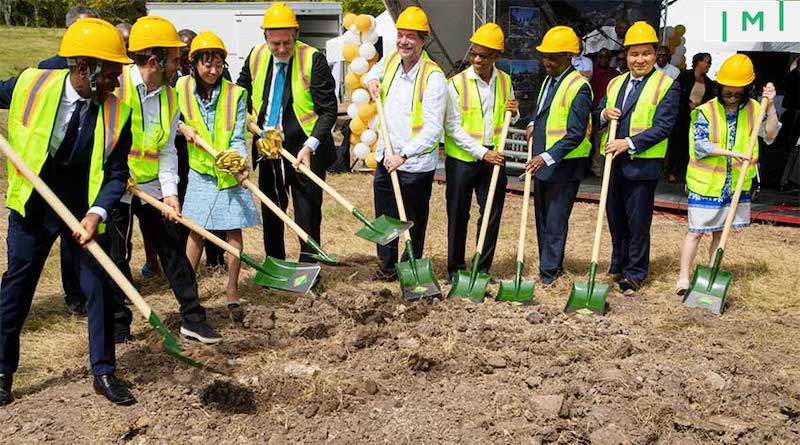Caribbean CBI Real Estate: Off-Island Escrow Accounts Raise Concerns
By Christian Henrik Nesheim and Ahmad Abbas
*Correction: An earlier version of this article incorrectly stated that construction on Hartman’s projects in Grenada had not started. In fact, construction started in 2021.
Grenada strictly enforces rules on CBI real estate that require 20% equity from the developers and escrow accounts in local, rather than foreign, bank accounts. Saint Lucia, meanwhile, allows its CBI developers to maintain an escrow account abroad, a practice that could compromise the CIU’s ability to verify that the investor actually paid in the full amount.
Grenada and Saint Lucia: Divergent policies on escrow accounts
During a two-hour interview on Beyond the Headlines earlier this week, Grenada’s Prime Minister Dickon Mitchell fielded a variety of questions about the performance of the country’s Citizenship by Investment Program (CIP).
Following three consecutive record quarters, the CIU had nearly 1,500 pending applications on hand at the end of March this year. Conceding that the program now has “quite the backlog […] partly because Grenada was one of the only islands in the Caribbean that was – at least openly – processing Russian and Belarusian applicants.”
In reality, even Grenada’s CIU was not openly processing Russians until IMI questioned the unit directly in June of last year, encouraging an explicit policy pronouncement.

PM Mitchell also attributed the processing backlog to the Unit’s having been “leaderless” for most of 2022, when interim CEO Karline Purcell managed the Unit. In April, seasoned due diligence professional Thomas Anthony took the reins at the Grenada CIU, and the PM indicated that his presence was already being felt and making a difference to processing capacity.
PM Mitchell lamented the former administration’s approach to CBI real estate regulations, which he indicated had given rise to questionable development practices:
“It took quite a while before the former administration put the escrow account system in place,” he explained. “And by then, it was too late, because it’s quite clear that some developers committed less-than-proper acts and absconded with the investors’ money and, ultimately, Grenada’s money. And the so-called shrimp farm is a perfect example of that.”
The PM emphasized the importance of keeping escrow accounts within Grenada in order to better monitor the proper flow of funds between developers and CBI investors to prevent unauthorized discounting and ensure timely construction progress.
“When we got into office, there was one developer who, for reasons that I am quite unable to understand, the government had permitted to have the escrow account outside of Grenada. And we made it clear that that account must be in Grenada. So, to that extent, if a developer is unable to fulfill its obligations, the funds are in escrow and – obviously – we will not release it.”
Stressing that CBI developers “must have skin in the game and must come with funds”, PM Mitchell drew attention to the former administration’s introduction of a 20% equity requirement, which he said had been effective in making sure developers put their own money on the line. This practice, combined with keeping the escrow accounts in Grenada, he explained, prevents sham developments and unfinished projects. Other islands, he indicated, had struggled with this.
“We are not going to have an open-ended situation where the so-called projects just drag on indefinitely, and I think Saint Kitts faced that situation. As you can see, the administration of Prime Minister Drew had to take drastic action by effectively canceling all approved projects and having them re-apply. We have already begun, since taking office, reviewing the approved projects. In fact, we have de-certified six of them. Because, if you’ve been approved, and you have not started the project, and there’s no indication that you’ll be in a position to do so, we will not hesitate in de-certifying the project.”
Grenada CIP Approved Real Estate Projects:
Grenada and Saint Lucia: Two very different approaches to CBI real estate escrow rules
Grenada’s insistence on keeping escrow accounts in Grenada contrasts with practices among some of its regional peers. In Saint Lucia, for example, the CIU has permitted developer Caribbean Galaxy to use an escrow account in China, relying on the developer itself to prove the clients have made the requisite US$200,000 minimum investment remittance.
This practice has drawn into question the Saint Lucia CIU’s ability to independently verify that investors in these projects actually made payments into the escrow account. The developer’s client agreements, seen by IMI, clearly indicate it is the developer itself, rather than the investor, that places the funds in escrow, while the investor “will only provide a one-time payment” to the developer.
Specifically, clauses 3 and 4 of the Title Release Agreement the developer signs with investors, state (emphasis ours):
3. It has been agreed between the Developer and the Investor that the Investor will only provide onetime payment of $____________.
4. The Developer hereby undertakes to deposit the stipulated amount by the Government US$200,000.00 in the Escrow account on behalf and in the name of the Purchaser with the stipulated Escrow Agent within Ten (10) days, after Purchaser paying Citizenship Government Fee to the Developer’s Service Agent and the agreed price as per clause 3 to the Developer. The Developer will ensure that the Escrow Confirmation Letter, and all required documents/confirmation regarding the Purchase and sale of the agreed Real Estate Unit shall be submitted on time.
The same Title Release Agreement stipulates that, at the end of the mandatory holding period, the investor commits to transfer the title deed to the developer at the nominal price of one dollar.
Questioned as to whether there is any way for the Saint Lucia CIU to independently verify that the CBI applicant has remitted the full $200,000 to the escrow account, Galaxy provides the following response:
“Yes, the government receives independent verification in the form of bank statements sent directly from the escrow agent to the government evidencing the receipt and the holding of escrow funds.”
But even if the escrow agent sends bank statements “evidence of the receipt and the holding of escrow funds” to the government, the purpose of this exercise is defeated if, in practice, it is the developer itself that funds the escrow account “on behalf of and in the name of the Purchaser,” as stated in the Title Release Agreement.
If this is the case, it means Galaxy – or any other CBI developer on the island, for that matter – would be in a position to receive a sum inferior to the requisite $200,000 from the investor and, as long as the developer itself places $200,000 in the escrow account, the CIU will consider itself satisfied that the investor paid in $200,000, even though the investor may have paid the developer a much smaller amount.
In other words, the proof of paid-in funds to the escrow account does not actually prove that the client paid the full amount. There’s nothing stopping the developer from repeatedly paying in and taking out the same $200,000 from the escrow account, never actually raising $200,000 from the investor.
Note: IMI does not claim that Caribbean Galaxy or any particular developer is wilfully misleading the Saint Lucia CIU by raising amounts under US$200,000 from investors while appearing to have raised US$200,000, merely that the escrow rules in Saint Lucia, as currently formulated and enforced, would permit such practice if the developer were so inclined. We posit that this state of affairs constitutes a moral hazard.
Indeed, IMI has received forwarded versions of client offers from a Saint Lucia developer quoting a price of US$85,000 for a single applicant, a sum that purports to include the principal investment, government fees, and professional fees. At least five different CBI promoters have contacted IMI about this practice, which they consider detrimental to the program’s integrity.
See also: Caribbean CBI Discounting “Will Continue Until Governments Put Their Foot Down”
One prominent investment migration company head, speaking to IMI on condition of anonymity, commented that “if this [$85,000 all-in] is a legitimate route to citizenship in Saint Lucia, the government needs to come out and say so. Meanwhile every applicant that goes this route is depriving the people of Saint Lucia of either $100,000 or so in donation or $200,000 investment into the economy. We can’t understand what could possibly drive the CIU to allow this to happen or how it makes economic sense.”
He laments that this practice of discounting leaves CBI companies with a dilemma: Take part in the discounting, or go elsewhere:
“Ourselves and other legitimate players in the industry can either join the game, which kills what is left of the official program, or we just take our clients elsewhere. Any investor tempted by this route would need to tread carefully for fear of a Cyprus-type situation where this gets looked at retrospectively and such citizenships are examined more closely for how they were obtained.”
In March this year, Grenada’s CIU issued a stern warning to those promoting its program at illicit discounts: Buyers of Illegally Discounted CBI Real Estate Could Lose Citizenship. In April, the Saint Lucia CIU circulated a similar, more timid message, merely indicating that offering discounts on CBI real estate represented a violation of license terms, but stopping short of warning of specific consequence.
IMI has contacted the Saint Lucia CIU on two occasions for comment on the matter but has so far not received a response to the questions.
Galaxy itself, when contacted by IMI, emphasized that the reason they keep the escrow account in China rather than in Saint Lucia is because no local banks would offer the service:
“Countries such as Saint Lucia and Dominica do not have a requirement for CBI developer escrow accounts to be held in-country,” a company representative explained to IMI in an email.
“Nevertheless, Galaxy sought to establish an escrow account in St Lucia but was unable to do so because no local banks offer the service. By contrast, St Kitts and Nevis does have this requirement, which is why Galaxy escrow funds in that country, for instance, are held in a local bank that offers the service.”
In the same response, Galaxy’s representative said its projects in Saint Kitts & Nevis were proceeding as planned:
“Phase 1 of the Ramada resort is completed and the hotel is open. Two further approved projects – Phase 2 of the Ramada development and the prison project – are live and progressing.”
Galaxy’s assurance notwithstanding, neither the Ramada nor the controversial prison project are listed on the Saint Kitts & Nevis CIU’s website as approved projects as of today.
Between 2019 and 2022, according to the Saint Lucia CIP’s annual reports, CBI applicants had invested US$102.1 million in approved real estate projects (See: Investment in Saint Lucia CIP Doubled in FY2021-22 Thanks to Sharp Increase in Real Estate-Based Applications). The program’s approved real estate development, Galaxy’s Canelles Resort, formally broke ground in January 2020, more than three years ago.
Asked for an update on construction progress, Galaxy provided the following response:
"Construction of the 250-room Dreams Hotel at Canelles began in early 2020 just as the COVID-19 pandemic shut down the world. Development of the resort was regrettably delayed for more than two years by the pandemic and, more recently, by further negotiations with local construction agents vying to build the resort. Construction now continues at speed and to the satisfaction of the government. The superstructure of one three-storey guest accommodation block is completed and contruction of another identical building has reached the first floor. Work on the concrete superstructure of the largest building - comprising the main lobby, reception and dining areas - began earlier this year and is due for completion in early 2024. Galaxy provides regular updates on progress to the Government of St Lucia."
Caribbean Galaxy has chosen not to develop any CBI projects in Grenada.


